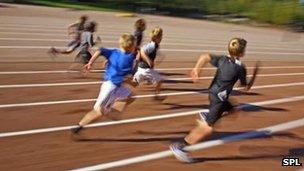London 2012: Funds for school-site sport clubs
- Published
- comments

Funding will be made available to open up school sports facilities to the wider community
Funding for a community sports club at every secondary school in England has been announced by the government.
Culture secretary Jeremy Hunt said it was part of a £1bn strategy to encourage young people to take up sport - as pledged in the 2012 Games bid.
Mr Hunt said despite huge investment of public funds since winning the Games, fewer young people were playing sport and he wanted a "radical change".
A further £32m of funding was also announced for the School Games., external
Money pledged from the Department of Health (£14m), Sainsbury's (£10m) and Sport England (£8m) will extend the initiative from two to four years until 2015.
Under the five-year youth and community sport strategy, Sport England will help set up some 4,000 clubs where expert coaches will run sessions to create ties between schools and existing local sports clubs.
'Fundamental problem'
Already, 2,000 football clubs have pledged to be linked to secondary schools by 2017, in rugby union 1,300 clubs, cricket, 1,250 clubs and rugby league and tennis 1,000 clubs each, according to the government.
The minister said they were looking to tackle what was a fundamental problem with youth sport.
He said: "A third fewer people play sport after their 16th birthday than before it - it is that crucial moment when they leave school where everything is organised and go into adults life.
"Up to now we have had policies to get people to play sports in their schools and policies to play in their communities but there has been no attempt to join the two.
"This is the first time we will have had proper links with local sports clubs and schools."
In an attempt to give greater public access to school sports facilities - three-quarters of sports halls and artificial pitches and a third of swimming pools in England are located on school sites - £10m of funding will be available.
A further £100m will be invested in creating the clubs and tackling the decline in sports participation when people leave school.
Payments-by-results
Of this, £50m will be invested to boost sport provision at further education colleges and universities with funding for a full-time sports professional at at least 150 further education colleges.
Between 2013 and 2017 around £450m will go to sports governing bodies to help develop their sport plans but their funding will be allocated on a "payments-by-results" basis.
Mr Hunt said: "Our bold approach will see money going to organisations that deliver on youth participation, but also withdrawn quickly from those which fail to meet agreed objectives."
Sport England Chief Executive Jennie Price said: "Changing the sporting behaviour of a generation is a major challenge, which has not been achieved by any other Olympic host nation.
"With a new focus on young people and an even tougher, Government-backed regime of payment by results, Sport England and its partners are determined to deliver."
The money comes from the Lottery and government funding through Sport England - £200m of which was from the current Spending Review settlement.
Using the London Olympics as inspiration, the School Games aims to transform competitive sport in schools and get more young people playing sport.
Adidas has also signed up to provide kit for 1,600 youngsters who will compete in the finals event of the School Games in the Olympic Stadium and other Olympic venues in May.
Health Secretary, Andrew Lansley said: "The School Games is a great example of how we can use fun and engaging ways to get more children into the habit of being active.
"Not only is this vital for good health but it is a great way to build self-esteem and confidence."
- Published22 December 2011
- Published22 December 2011
- Published22 December 2011
- Published22 December 2011
- Published22 December 2011
- Published22 December 2011
- Published22 December 2011
- Published22 December 2011
- Published21 November 2011
- Published6 October 2011
- Published21 August 2011
- Published19 July 2011